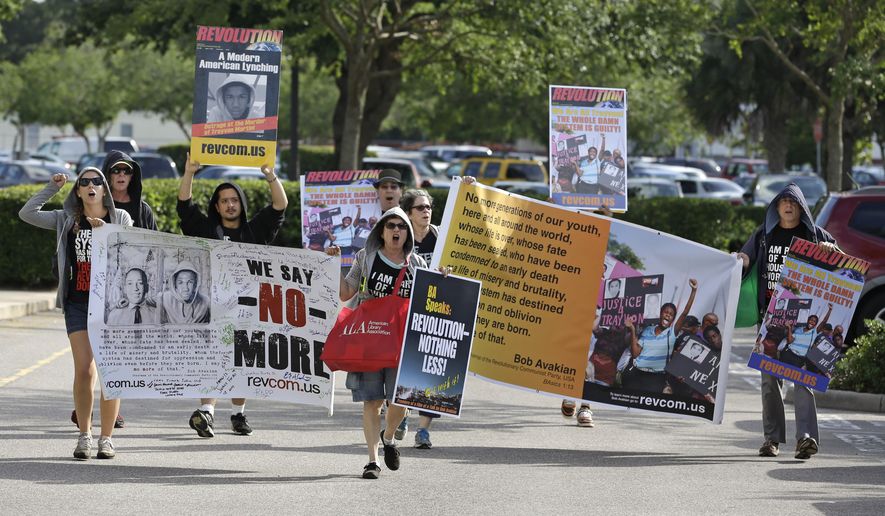The Communist Party of the USA will celebrate its 100th birthday this weekend in Chicago, at a conference replete with questions about what the future holds for the organization when national Democrats already embrace some of its most coveted goals.
The talk in the run-up to the conference includes questions on whether Communists should embrace Rep. Alexandria Ocasio-Cortez’s Green New Deal proposal — a resounding “yes” — and whether China finally has succeeded with the socialist experiment.
Once in town, party members will vote on resolutions on expanding voting rights, legalizing illegal immigrants and opposing Republicans in the 2020 elections — largely echoing what one might hear at a Democrat-led press conference on Capitol Hill nowadays.
“There’s some thinking that ’communism’ has always been a sort of bogeyman, and yet we want some of the same things,” said Harvey Klehr, a history professor at Emory College who specializes in the American left.
The connections between the Communists and the increasingly active Democratic left wing have been highlighted by Ms. Ocasio-Cortez and Sen. Bernard Sanders, who emerged from the democratic socialist movement to become leading critics of capitalism and guiding lights of the broader Democratic Party.
That, Mr. Klehr said, is heady stuff for the Communists.
“The left is very excited that Sanders has normalized socialism, and in a sense he’s doing what they wanted to do,” he said. “So now I imagine those in the CPUSA think they’re not members of the Democratic Party but they want to take it over.”
Neither CPUSA nor its chairman, John Bachtell, responded to multiple phone calls and emails seeking comment.
Around the globe, conferences and “party congresses” among Communists have been stormy affairs. From the Bolshevik-Menshevik split in London in 1903 to Nikita Khrushchev’s “Secret Speech” denouncing Josef Stalin in Moscow in 1956 to American Communist Gus Hall’s refusal to embrace Mikhail Gorbachev’s reforms in the Soviet Union in the 1980s, the earnest revolutionaries have often been roiled with internal bickering.
The gathering in Chicago promises to be sleepier, though the role of Communists in the modern political system will be of the utmost importance.
In one of the online discussions ahead of the conference, Communists debated whether Democrats can be good partners.
“The fact that the Democrats are also used by sections of the capitalist class cannot be used as a reason to refuse to participate, because there is simply no other choice at the moment,” C.J. Atkins wrote.
He concluded: “We have to always remember who the real enemy is. It’s not the followers of Bernie Sanders, that’s for sure.”
The Democratic Socialists of America seem less excited about the shotgun marriage.
“CPUSA is an entirely independent entity from the DSA,” press relations official Lawrence Dreyfuss said. “We have no comment to give in relation to CPUSA at this time.”
Elsewhere among the CPUSA’s discussions, writer Ben Bath declared “springtime for socialism.” He said Mr. Sanders’ 2016 presidential run, when he fell short of claiming the Democratic presidential nomination, was “a kind of culmination of an epochal, generational shift in the United States regarding socialism.”
Mr. Klehr said not to expect a lot of dissenting opinions in Chicago.
“By and large, the party has become irrelevant,” he said. “These affairs tend to be highly choreographed and with virtually no dissent. It’s very rare to have factions.”
The CPUSA was formed in Chicago as an outgrowth of the Socialist Party by communists enthralled with the Soviet experiment and convinced that more moderate paths offered by social democrats had failed.
Those divisions, with fractures caused by the communism practiced by Mao Zedong and his successors in Beijing, have played out over the years with turmoil at the top.
John Bachtell, the current CPUSA chairman, replaced Sam Webb, who quit the party in 2014 when he decided he was a democratic socialist, Mr. Klehr said.
Mr. Webb replaced Mr. Hall, the hard-line leader who, with black radical Angela Davis, headed the Communist ticket for president for decades, garnering votes along the way from figures such as former Obama administration CIA Director John O. Brennan and fired FBI Director James B. Comey.
Mr. Bachtell took the reins the last time the CPUSA held its annual conference in Chicago. When he did so, he stressed that while the party would remain peaceful “for as long as possible,” the goal was a socialist takeover of the U.S. through political means.
Whatever the hopes of party loyalists, communism has yet to break through even among younger voters who might otherwise be receptive.
The Victims of Communism Memorial Foundation, which surveys on the issue, said socialism is hugely popular, with 46% of millennials saying they want a socialist society. Capitalism is next at 40%, trailed by fascism at 8% and communism at 6%.
A Rasmussen Reports poll in 2017, timed to the 100th anniversary of the Bolshevik Revolution in Russia, found 9% of Americans overall had a favorable view of communism.
Mark Steinberg, a Russian and Soviet history professor at the University of Illinois, said that in talking to his students he has concluded that the Communists will always struggle to get their message out.
“One of the most striking developments in U.S. political life in the last few years has been the dramatic return of ’socialism’ to the political mainstream, especially among young people,” Mr. Steinberg wrote to The Washington Times from Moscow, where he is conducting research. “’Democratic Socialism’ [is] the most popular term, though many young people are rediscovering Marxism-Leninism though generally with no interest in the CPUSA, which is seen as out of touch with what is new and exciting, moribund as an organization, and tarred by its history.”
• James Varney can be reached at jvarney@washingtontimes.com.




Please read our comment policy before commenting.